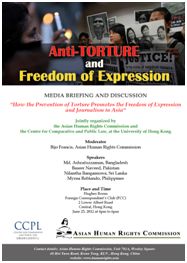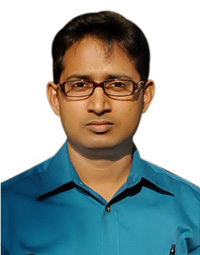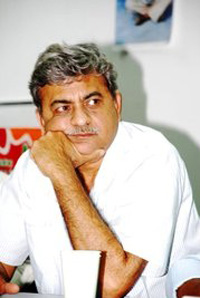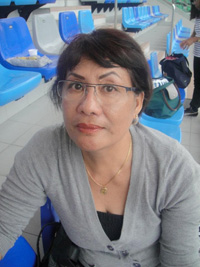(Hong Kong, June 22, 2012) The Asian Human Rights Commission (AHRC) and Centre for Comparative and Public Law (CCPL) at the University of Hong Kong, are inviting journalists for a discussion with former journalists and the widow of a murdered journalist about the importance of the prevention of torture to promote freedom of expression.
 The event’s theme, “How the Prevention of Torture Promotes the Freedom of Expression and Journalism in Asia,” will be held on June 25 (Monday), from 4pm to 6pm at the Foreign Correspondent’s Club (FCC), Hong Kong.
The event’s theme, “How the Prevention of Torture Promotes the Freedom of Expression and Journalism in Asia,” will be held on June 25 (Monday), from 4pm to 6pm at the Foreign Correspondent’s Club (FCC), Hong Kong.
Freedom of expression is the cornerstone of the protection of civil liberties; and journalists play a crucial role in this. Without freedom of expression, prevention of torture by documenting these cases would be difficult. The role of investigative journalists in exposing torture cases Asian countries, where authoritarian and oppressive structures continue to operate, is very important.
The denial of freedom of expression has had serious implications, not only in the protection of absolute freedom from torture, but also in the practice of journalism in developing countries in Asia.
As an illustration, journalists involved in documentation of torture cases have been killed and face continuing threats, like the case of the victims and survivors of the Maguindanao massacre in the Philippines; journalists who were tortured, killed and forcibly disappeared in Pakistan and journalists in Sri Lanka and Bangladesh who have had to leave their countries after they were targeted and tortured for reporting on torture.
In most developing counties, journalists provide opportunities for possibilities of remedy by documenting their case. The victims and their families seek their support for redress. The journalist plays an important role because their reporting draws attention in creating socio-political discourse seeking for appropriate intervention by the State and public.
The speakers for this event are Md. Ashrafuzzaman, Bangladesh; Nilantha Ilangamuwa, Sri Lanka; and Baseer Naveed, Pakistan. These journalists have been actively involved in advocating for the prevention of torture so as to promote free expression in their respective countries. The other is Myrna Reblando, the widow of Alejandro “Bong” Reblando, one of the journalists murdered in the 2009 Maguindanao massacre.
About the speakers:
Md. Ashrafuzzaman, Bangladesh
 Md. Ashrafuzzaman is a staff member of the Asian Human Rights Commission (AHRC). He is a co-coordinator of the organisation’s Urgent Appeals Programme and in charge of the Bangladesh Desk. He is a Bangladeshi national with a degree in literature from the National University of Bangladesh. He began his career as a journalist in 1990 and engaged in human rights activism at the grassroots level.
Md. Ashrafuzzaman is a staff member of the Asian Human Rights Commission (AHRC). He is a co-coordinator of the organisation’s Urgent Appeals Programme and in charge of the Bangladesh Desk. He is a Bangladeshi national with a degree in literature from the National University of Bangladesh. He began his career as a journalist in 1990 and engaged in human rights activism at the grassroots level.
From June 1990 to March 1995, Ashrafuzzaman worked as correspondent and later become a staff reporter for Daily Deshhitoishi (Patriot), a vernacular daily newspaper in the town of Jessore. He was a member of Press Club Jessore from 1991 to 1997. In March 1995 Ashrafuzzaman was the executive editor of Human Rights Fact-finder, a newsletter published by a human rights organisation in Dhaka. This newsletter used to focus on human rights and socio-cultural issues.
In 1997 he left the editorial job to become Fact-finding Coordinator for the Bangladesh Rehabilitation Centre for Trauma-victims (BRCT), a human rights organisation based in Dhaka. He has documented cases of custodial torture, extrajudicial executions and issues of civil and political rights in Bangladesh.
He joined the AHRC in late 2007.
For his talk, he wishes to discuss the current situation of freedom of expression in Bangladesh, as one of the examples in Asian countries, the challenges for the professional to exercise their basic rights within the country, as well as the role that could be played by their colleagues.
Baseer Naveed, Pakistan
 Baseer is a staff member of the AHRC. Before joining he was deeply involved in the grassroots movement, notably the Citizen Action Committee formed in 2001 in Pakistan. He was the key person in redesigning the Karachi Expressway to prevent the displacement of about 40,000 people, which eventually saved millions of others threatened by forced evictions. He also worked as broadcast journalist.
Baseer is a staff member of the AHRC. Before joining he was deeply involved in the grassroots movement, notably the Citizen Action Committee formed in 2001 in Pakistan. He was the key person in redesigning the Karachi Expressway to prevent the displacement of about 40,000 people, which eventually saved millions of others threatened by forced evictions. He also worked as broadcast journalist.
Baseer’s experience as a journalist and his friendship with other journalists has been helpful in exposing attacks, which includes torture, forced disappearance and extrajudicial killings, against journalists in the line of their duty. He helped developed discourse on the practice of torture in Pakistan, particularly those targeted against journalists and human rights defenders.
He is also an Ashoka Fellow, who describes themselves as “leading social entrepreneurs who we recognize to have innovative solutions to social problems and the potential to change patterns across society.”
Myrna Reblando, the Philippines
 Myrna is the wife of Alejandro “Bong” Reblando, one of the journalists murdered in the Maguindanao massacre in November 2009. For two years, as the vice-chair and spokesperson for the Justice Now!, an association of the families of the slain journalists, she openly spoke about the lack of protection to witnesses and remedies for victims and families of the massacre.
Myrna is the wife of Alejandro “Bong” Reblando, one of the journalists murdered in the Maguindanao massacre in November 2009. For two years, as the vice-chair and spokesperson for the Justice Now!, an association of the families of the slain journalists, she openly spoke about the lack of protection to witnesses and remedies for victims and families of the massacre.
As a result of her work, she became the target of threats with a bounty of Php 3 million on her head. Due serious threats on hers and her family’s life, she left the Philippines together with her daughter, to seek political asylum in May 2011.
In April 2010, she received the posthumous award during the 14th Human Rights Press Award hosted by the Foreign Correspondent’s Club, Hong Kong (FCC) on behalf of the massacred journalists and their family members.
Myrna will speak about the impact of the massacre, not only on the issue of freedom of expression, but also on the documentation on cases of torture and extrajudicial killings targeting journalists, in Mindanao and other places.
Nilantha Ilangamuwa, Sri Lanka
 Nilantha is a staff member of the AHRC. Before joining as the organisation’s communication officer, he had ten years of experience in journalism. He also edits an online newspaper, Sri Lanka Guardian. The online newspaper covers articles on society, politics, defence and ethnic problems, providing a source of daily news on the socio-political situation. The articles were also used by other blogs and websites.
Nilantha is a staff member of the AHRC. Before joining as the organisation’s communication officer, he had ten years of experience in journalism. He also edits an online newspaper, Sri Lanka Guardian. The online newspaper covers articles on society, politics, defence and ethnic problems, providing a source of daily news on the socio-political situation. The articles were also used by other blogs and websites.
During his ten years of journalism, he worked as defence correspondent (2006-2007) for the Sunday Standard, as foreign news editor (2006-2007) for Mawbima, writer (2004-2006) for Divaina and writer (2003-2004) for Siwdesa, all in Sri Lanka. His articles have been published in various newspapers and websites around the Globe including, Sunday Times( Sri Lanka), Daily News (Sri Lanka), Daily Star ( Bangladesh), Counter Currents ( India),South Asia Analysis Group ( India), Scoop – New Zealand News, Counter Punch ( USA).
He obtained a Bachelor’s Degree in Mass Communication, Sociology and Political Science from the University of Kalaniya in Colombo in 2006.
Recently, he developed the idea of a magazine to focus on the subject of torture. This is to encourage people to come forward by sharing their experiences for social reformation. The Magazine covers three basic areas of torture, firstly, narratives of the torture victims, secondly, interviews with human rights defenders and thirdly, essays explaining the theoretical and social aspects of torture.